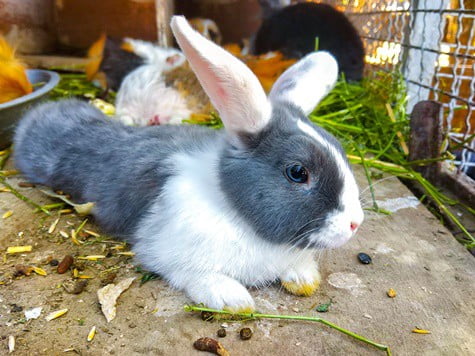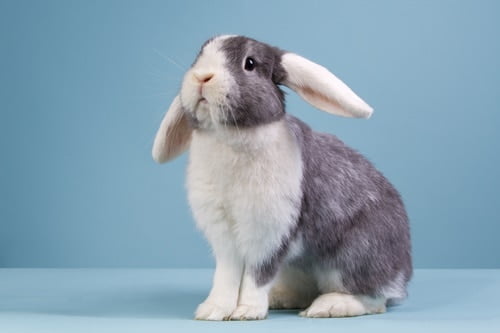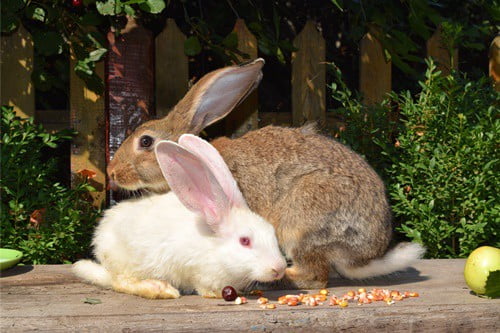You’ve likely observed a myriad of different rabbit behaviors. In the wild, rabbits are prey animals, so their body language is purely instinct-based. It helps to understand your pet’s body language. Signs such as shaking, twitching, and trembling let an owner know if a rabbit is uncomfortable.
The common causes of shaking are fear, nervousness, and stress. A less obvious cause of trembling is heat, as rabbits do not tolerate high temperatures well. If your rabbit is lying on its side and shaking, it could be due to a digestive issue (GI stasis). Also, it may have ingested something toxic.
Hiccups are commonly confused with shaking in rabbits, but they are rarely a cause for concern. In many cases, you will have to look out for other physical symptoms, such as scratching (in the case of mites), to determine the underlying cause of your pet rabbit’s discomfort.
Why Is My Rabbit Shaking?
| Symptom | Cause |
|---|---|
| Shaking of the ears or shaking of the head while running | High temperatures or heatstroke |
| Side swaying or head bobbing | Stress |
| Trembling or twitching of the nose | Fear or stress |
| Minor spasms | Hiccups |
| Excessive shaking of the head with the scratching of the ear or body | Mites |
| Laying down and shaking | GI stasis |
| Laying on the side and shaking with disorientation or clumsiness | Eating something poisonous or toxic |
A rabbit can shake for a number of reasons. Luckily, some of them are less distressing than others. Hiccups are a harmless cause of shaking in rabbits. A rabbit may also have small spasms every time it hiccups. A hiccup shake can appear distressing but won’t harm a rabbit.
As long as hiccups last for less than 20 minutes, they aren’t a cause for concern. If your rabbit has been having hiccups frequently, check what you’ve been feeding it recently. Something new in your rabbit’s diet may be the culprit.
A rabbit’s shake is serious if it’s in pain. Rabbits are at the bottom of the food chain. They’re highly skilled at hiding signs of pain or weakness to avoid being hunted.
A rabbit may shake in an attempt to contain its pain. To check if your rabbit is hurting, gently feel their body to see if it reacts to you touching a specific part of its body. You may have to feel various parts of its body to detect an injury, or feel the stomach to check for gas.
Rabbits Shake When It’s Hot
Contrary to popular belief, rabbits are more tolerant of cold temperatures than warm temperatures. A rabbit has physical adaptations, such as its dense fur and building a thicker fat layer in the body to survive cold weather. Heat, on the other hand, is likely to make a rabbit ill.
Temperatures over 80 degrees Fahrenheit (26º C) will cause rabbits distress. High temperatures will also make your rabbit tremble or shake. Shaking in the heat may sound counterintuitive as trembling is an adaptation to cope with cold temperatures. However, rabbits are different.
During periods of high heat, a rabbit can even suffer from a heat stroke. If left untreated, your rabbit may have convulsions and die. In humans, heat exhaustion leads to many symptoms, such as dizziness. Unfortunately, rabbits cannot regulate their body temperature by sweating.
According to the Asian Journal of Poultry Science, rabbits largely rely on vasodilation (dilation of blood vessels) for temperature regulation. More specifically, they dilate the blood vessels near their ears. This explains why your rabbit may be shaking its ears, or shaking its head and running.
Shaking the ears or shaking the head while running is a way for rabbits to regulate their core temperature when it’s overheated. Heatstroke is a severe cause for concern in rabbits. Other symptoms of heatstroke in rabbits include:
- Reddening of the ears
- Salivating
- Panting
- Lethargy
- Slow movement
- Lethargy
- Acting confused
- Convulsions
How to Treat Heatstroke in Rabbits
If your rabbit is showing signs of heatstroke, your goal should be to reduce its temperature.
An outdoor rabbit should be immediately brought inside and kept in a cool and comfortable room. Leave a cold compress, a pillow, and a damp sheet near your rabbit. If heat is disturbing your rabbit, it will come closer to cooler objects or surfaces to feel better.
You can also try gently misting your rabbit’s ears with clean water. Never completely submerge or bathe a rabbit as this can cause severe distress, cardiac arrest, and death in rabbits.
If your rabbit does not stop shaking its head or trembling, or if it continues to show signs of heat exhaustion, take it to a vet immediately. Never attempt to reduce your rabbit’s temperature too rapidly (for example, with ice) as this can seriously harm your pet.

Rabbits Shake When They’re Frightened
It’s normal for a rabbit to tremble when it is scared. It’s easy to tell when a rabbit is frightened through its body language. Oftentimes, a rabbit’s nose will also vibrate in stressful situations.
Rabbits get scared for a plethora of reasons. For example, loud noises. If your rabbit is showing signs of fear, take a look at its habitat and keep a lookout for other possible symptoms.
Rabbits that are chronically stressed are also likely to twitch, tremble, or shake. Side swaying and head bobbing is often a telltale sign of extreme stress in rabbits. Some experts believe shaking may be a self-soothing function in stressed rabbits.
A New Habitat
A rabbit may get stressed or scared due to a change in surroundings or trauma. If you’ve just brought your rabbit home, it may be missing its previous environment at the farm or in the pet store. It may even be missing its siblings, mother, or other playmates.
Unwanted Company
Some rabbits that are used to being solitary may not tolerate other rabbits or pets near them and thus, get easily frightened when they have company.
Not Spaying or Neutering Rabbits
Rabbits that have not been spayed or neutered may attempt to mount each other. Note that this isn’t always an attempt to mate. An unneutered male rabbit may mount another male to assert his dominance or relieve his pent up sexual energy. This can cause stress in some rabbits.
Despite your best efforts, many factors can cause stress in your rabbits. This makes quality care crucial in raising pet rabbits. According to the Proceedings of the National Academy of Sciences of the United States of America (PNAS), domestic rabbits are less likely to be frightened compared to wild rabbits.
A rabbit that is stressed may not only shake, but it may also spray urine. If you’ve just brought your pet home, talk to your vet about how you can allow your rabbit to adjust to its new environment.
Hiccups
Sometimes it can be hard to tell whether your cat is actually shaking is having hiccups, especially when it comes to long-haired rabbits.
Rabbits are grazers and are less likely to eat too quickly. In many cases, rabbits get hiccups as a result of a gastrointestinal issue. However, even though rabbits may not eat too fast, they can easily eat too much, or eat too much of the wrong food.
An upset stomach is a common issue after eating something too rich in carbohydrates or sugar. The same goes for foods containing nutrients that may not be necessarily good for them. This may lead to hiccups in animals, which has been reported in rabbits according to BioEssays.
However, the exact cause of hiccups is still a mystery. However, some theories suggest they may be a result of spasms in the respiratory muscles. Hiccups are rarely a cause for concern in rabbits.
If your rabbit has the hiccups, reassure your pet softly by caressing them. Touch your rabbit’s ears, nose, stomach, and belly to gently ease its digestion and respiration. Do not do this too firmly or aggressively as it may cause damage.
Your rabbit may also be breathing fast, so try to recognize its normal breathing pattern. If your rabbit has the hiccups, it may shake its head or move its ears side to side. Sometimes, hiccups may cause tremors to travel through a rabbit’s entire body in severe cases.
Mites
Mites can affect rabbits in three ways: ear mites, fur mites, and burrowing mites. Mites can cause your rabbit’s ears to shake. The following goes through each type of mite infestation in rabbits, along with the accompanying symptoms.
Ear Mites
Ear mites are found in the inside of the ear near the pinnae. They can cause severe irritation in rabbits but aren’t so common in indoor rabbits. However, you can easily bring mites into your home through your clothes or shoes and transfer them to your pet.
Ear mites are notorious for causing excessive shaking of a rabbit’s head. Other symptoms of ear mites in rabbits include:
- Constant scratching of the ears
- Inflamed and crusty inner ear
- Hair loss at the back of the ears
Fur Mites
Fur mites are common around springtime in rabbits. The areas most affected are often the back and the neck. Fur mites can look like dust on your rabbit’s fur. If your rabbit is suffering from a case of fur mites, it will be continually scratching the affected area of its body.
Burrowing Mites
Burrowing mites aren’t so common in European rabbits and rabbits in the U.S. However, some unlucky rabbits can get infected.
With burrowing mites, a female mite digs into your rabbit’s skin, laying her eggs in the burrowed region. The larvae hatch and continue to thrive on your rabbit’s body. Mites can lay 5 eggs up to 5 times, and this can happen within 2-3 weeks.
You will see white dust on your rabbit’s fur if it has been infested with burrowing mites.
Any mite infestation can lead to severe discomfort and stress in rabbits. Your rabbit may shake because its ears are itchy, or because it is feeling distressed. Take your rabbit to a vet immediately for treatment if it has any of the above mites.

Ear Infections
Rabbits can get ear infections with varying levels of severity. In most cases, ear infections occur because of ear mites or the buildup of wax in the inner ear. Signs of an ear infection include:
- Shaking of the head
- Scratching the head
Keep a lookout for any behavioral changes in your pet rabbit. If your rabbit is shaking its head more than usual and you feel it isn’t normal for it, get your pet checked by a vet.
Shaking of the head is often a symptom of a serious issue that should never be left to the last minute. If your rabbit has an ear infection, your vet will address the problem and prescribe ear drops.
Laying Down and Shaking Due to GI Stasis
If your rabbit is laying on its side and twitching, it could be a sign of gastrointestinal stasis (GI stasis). GI (or gut) stasis is a life-threatening condition where the digestive system slows or shuts down. This causes bad bacteria to build up in the intestines, releasing gas into the digestive tract.
The buildup of gas can be excruciating for rabbits. Severe pain can reduce your rabbit’s willingness to eat or drink. This leads to a compounding issue because your rabbit will become more starved for nutrients and fiber, while also being severely dehydrated. The contents in your rabbit’s gut become more compact, making it even more difficult for it to pass it through.
Bacteria continue to release toxins into your rabbit’s system, which will eventually take a significant toll on its liver. Without treatment, the condition can cause the liver to fail.
GI stasis often occurs when a rabbit eats the wrong foods. Your rabbit may lay on its side in an attempt to relieve gas. If you ever notice your rabbit lying on its side, check their stomach for signs of bloating. Bloating and gas is a common symptom of GI stasis in rabbits.
GI stasis can be prevented. Ensure that your rabbit has a diet that is 80-90% made up of high-quality roughage, or hay. Your rabbit should also be drinking plenty of water. Make sure you offer your rabbit more water in the summer months to prevent overheating.
Always feed starchy veggies and high sugar fruits to your rabbits in moderation, or as a treat. Never feed your rabbits processed carbohydrates as this can lead to an upset stomach and GI stasis.
Eating Something Poisonous
If a rabbit ingests something toxic (e.g. rhubarb or mushrooms), its initial symptoms are likely to be disorientation and clumsiness. This is often followed by lying on the side and shaking. Other symptoms of eating something toxic in rabbits include:
- Diarrhea
- Squirming
- Panting
- High temperature
If not treated immediately, your rabbit may have seizures and die. According to Veterinary Partner, a type of flea treatment called Frontline can cause shaking, severe lethargy, and seizures in rabbits.
Regardless of the cause, if your rabbit is laying down and shaking excessively, it will need immediate veterinary treatment.
How to Prevent Shaking in Rabbits
There are many causes of shaking in rabbits. Therefore, you should maintain your pet’s overall health. The following tips may help you prevent common causes of shaking in rabbits:
- Diet. Your rabbit should eat quality hay, with fruit and vegetables in moderation. Never overfeed fruits or starchy veg to a rabbit as this may cause digestive issues, such as GI stasis.
- Hygiene. Not cleaning your rabbit’s hutch can cause disease and stress in rabbits.
- Temperature. Keep your rabbit’s living space away from direct sunlight and draughts. Rabbits cannot tolerate temperatures above 80 degrees Fahrenheit.
- Remove Stressors. Stressors, such as changes in temperature or your family cat, can bother your rabbit. Removing such stressors, or reducing your rabbit’s exposure to them, can help.
- Handling. Rabbits do not tolerate over-handling and can easily get stressed when handled inappropriately. Allow your rabbit to come to you and don’t pick it up if it doesn’t like it. Never lay your rabbit on its back as this can cause anxiety and paralysis.
Lagomorphs can shake for many reasons. While some causes of trembling in rabbits are serious and require immediate medical attention, others do not. In severe conditions, or if your rabbit is approaching its death, it will have convulsions (automatic muscle contractions).

